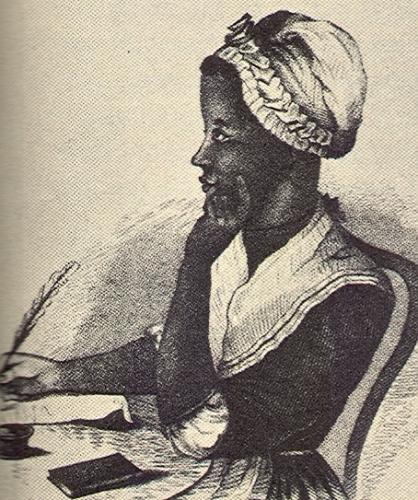 |
LITR 4231 Early American
Literature Sample Research Posts 2014 (research post assignment) Research Post 2 |
 |
Laura Tompkins
April 20, 2014
Phillis Wheatley: A Brief Discussion of Double Consciousness
On Being Brought from Africa to America
by Phillis Wheatley
'Twas mercy brought me from my Pagan land,
Taught my benighted soul to understand
That there's a God, that there's a Saviour too:
Once I redemption neither sought nor knew.
Some view our sable race with scornful eye,
"Their colour is a diabolic die."
Remember, Christians, Negros, black as Cain,
May be refin'd, and join th' angelic train.
These eight lines seem deceptively simple and straightforward but upon
closer inspection, there is a wealth of information that can be read into them.
A brief background on Phillis Wheatley will help put the following thoughts into
perspective. Wheatley (1753-1784) was a slave, captured from West Africa when
she was about seven. Her name was a combination of the ship name, Phillis, and
the family who purchased her, Wheatley. The Wheatley family found that she was
very bright and they taught young Phillis to read and write. By the time she was
eighteen, she was able to have a collection of poems published, thanks to Mrs.
Wheatley and the Countess of Huntingdon. Although the family did not release
Wheatley until 1774, they provided a sanctuary for her, which allowed her to
continue to write. After Mrs. Wheatley passed away, Phillis Wheatley’s health
problems and poor marriage led to her early death. 1
The lives of slaves were wrought with double meanings. Lemert discusses
the idea of double-consciousness as
W.E.B. Du Bois defines it, “this sense of always looking at one’s self through
the eyes of others, of measuring one’s soul by the tape of a world that looks on
in amused contempt and pity” (127). Africans brought to the colonies were forced
into a position of not quite being African and not being American. This was a
difficult way for any Black person to live but especially someone as highly
educated as Wheatley. After the death of
Mrs. Wheatley, Phillis Wheatley had been advised of the possibility of going
back to Africa. She responded by saying that she had assimilated to her new
country and “for Wheatley, shared language implies a shared culture” (Watson
104). She did not speak the language of her African heritage, so this advice was
frustrating for her.
Another way that slaves lived with double meanings was through religion.
O’Neale examines the relationship between Wheatley’s poems and the spirituals
that were sung on the plantations. To an outsider it would seem as if slaves
were singing songs of worship but they also represented their protestations at
slavery (O’Neale 145). In “On Being Brought from Africa to America”, O’Neale
also points out that for the slaves, the idea that “He was not just ‘a God’ but
‘a Saviour’ (148) again gives more
meaning than what appears on the surface. Black Christians believed that their
prayers to God would be answered and they would be delivered just as the Jews
were in the Old Testament.
Bilbro argues for the view that Wheatley perhaps saw the slave trade as
God’s providence, if one reads the poem in a straightforward way, but also
reading them in context with some of her other early poems, including her elegy
for George Whitefield. She talks about redemption for all, regardless of status
but especially for those who were directly involved in the slave trade. Bilbro
also says that, “while it has been often criticized, this poem provides a
complex rhetorical answer to Cowper’s question about how God might bring some
good from the evil slave trade” (565). While this view may not sit comfortably
for many, it is a possibility that she felt that despite the evil of those
involved in the trade, they were just as much in need of a Savior and deserving
of redemption if they repented.
As with all great works of art, literature, and music, analyzing the
layers of meaning is always an important and lively conversation to have.
Discussing Wheatley’s writings is a good example of why understanding the
context of when it was written and knowing about her background is crucial to
the study of slave narratives.
Works Cited
Bilbro, Jeffrey1. "Who Are Lost And How They're Found: Redemption And Theodicy
In Wheatley, Newton, And Cowper." Early American Literature 47.3 (2012):
561-
589. Humanities Source. Web. 20 Apr. 2014.
Lemert, Charles C. Thinking the Unthinkable: The Riddles of Classical Social
Theories. Boulder: Paradigm, 2007. Print.
O'Neale, Sondra. "A Slave's Subtle War: Phillis Wheatley's Use Of Biblical Myth
And Symbol." Early American
Literature 21.(1986): 144-165. Humanities
Source. Web. 19 Apr. 2014.
Watson, Marsha. "A Classic Case: Phillis Wheatley And Her Poetry." Early
American Literature 31.2 (1996):
103-132. Humanities Source.
Web. 19 Apr. 2014.
1
http://www.poetryfoundation.org/bio/phillis-wheatley
|
|
|
|

